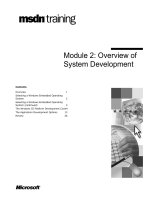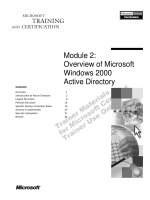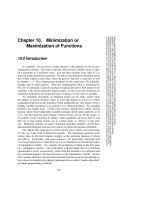HOME READING 2 SOURCES OF INFORMATION OR DATA pptx
Bạn đang xem bản rút gọn của tài liệu. Xem và tải ngay bản đầy đủ của tài liệu tại đây (88.53 KB, 6 trang )
PROBLEM – SOLVING COURSE
HOME
READING
2
SOURCES
OF
INFORMATION
OR DATA
FROM
HTTP://HUBPAGES.COM/HUB/-PRIMARY-AND-SECONDARY-DATA
2
1
Data
Data can be defined as the quantitative or qualitative values of a variable. Data is
plural of Datum which literally means to give or something given. Data is thought to be the
lowest unit of information from which other measurements and analysis can be done. Data
can be numbers, images, words, figures, facts or ideas. Data in itself cannot be understood
and to get information from the data one must interpret it into meaningful information.
There are various methods of interpreting data. Data sources are broadly classified into
primary and secondary data.
Importance of Data and Data Collection
Data is one of the most important and vital aspect of any research studies.
Researches conducted in different fields of study can be different in methodology but every
research is based on data which is analyzed and interpreted to get information.
Data is the basic unit in statistical studies. Statistical information like census,
population variables, health statistics, and road accidents records are all developed from
data.
Data is important in computer science. Numbers, images and figures in computer are
all data.
3
2
Types
of Data
Primary Data
Data that has been collected from first-hand-experience is known as primary data.
Primary data has not been published yet and is more reliable, authentic and objective.
Primary data has not been changed or altered by human beings, therefore its validity is
greater than secondary data.
Importance of Primary Data
Importance of Primary data cannot be neglected. A research can be conducted
without secondary data but a research based on only secondary data is least reliable and
may have biases because secondary data has already been manipulated by human beings. In
statistical surveys it is necessary to get information from primary sources and work on
primary data: for example, the statistical records of female population in a country cannot be
based on newspaper, magazine and other printed sources. One such sources are old and
secondly they contain limited information as well as they can be misleading and biased.
Validity
Validity is one of the major concerns in a research. Validity is the quality of a research
that makes it trustworthy and scientific. Validity is the use of scientific methods in research
to make it logical and acceptable. Using primary data in research can improves the validity of
research. First hand information obtained from a sample that is representative of the target
population will yield data that will be valid for the entire target population.
Authenticity
Authenticity is the genuineness of the research. Authenticity can be at stake if the
researcher invests personal biases or uses misleading information in the research. Primary
research tools and data can become more authentic if the methods chosen to analyze and
interpret data are valid and reasonably suitable for the data type. . Primary sources are more
authentic because the facts have not been overdone. Primary source can be less authentic if
the source hides information or alters facts due to some personal reasons. There are
methods that can be employed to ensure factual yielding of data from the source.
Reliability
Reliability is the certainty that the research is enough true to be trusted on. For
example, if a research study concludes that junk food consumption does not increase the risk
of cancer and heart diseases. This conclusion should have to be drawn from a sample whose
size, sampling technique and variability is not questionable. Reliability improves with using
primary data. In the similar research mentioned above if the researcher uses experimental
method and questionnaires the results will be highly reliable. On the other hand, if he relies
4
on the data available in books and on internet he will collect information that does not
represent the real facts.
Sources of Primary Data
Sources for primary data are limited and at times it becomes difficult to obtain data
from primary source because of either scarcity of population or lack of cooperation.
Regardless of any difficulty one can face in collecting primary data; it is the most authentic
and reliable data source. Following are some of the sources of primary data.
Experiments
Experiments require an artificial or natural setting in which to perform logical
study to collect data. Experiments are more suitable for medicine,
psychological studies, nutrition and for other scientific studies. In
experiments the experimenter has to keep control over the influence of any
extraneous variable on the results.
Survey
Survey is most commonly used method in social sciences, management,
marketing and psychology to some extent. Surveys can be conducted in
different methods.
o Questionnaire: is the most commonly used method in survey.
Questionnaires are a list of questions either open-ended or close -ended
for which the respondent give answers. Questionnaire can be conducted
via telephone, mail, live in a public area, or in an institute, through
electronic mail or through fax and other methods.
o Interview: Interview is a face-to-face conversation with the respondent.
In interview the main problem arises when the respondent deliberately
hides information otherwise it is an in depth source of information. The
interviewer can not only record the statements the interviewee speaks
but he can observe the body language, expressions and other reactions to
the questions too. This enables the interviewer to draw conclusions
easily.
o Observations: Observation can be done while letting the observing
person know that he is being observed or without letting him know.
Observations can also be made in natural settings as well as in artificially
created environment.
Secondary Data
Data collected from a source that has already been published in any form is called as
secondary data. The review of literature in nay research is based on secondary data, mostly
from books, journals and periodicals.
Importance of Secondary Data
Secondary data can be less valid but its importance is still there. Sometimes it is
difficult to obtain primary data; in these cases getting information from secondary sources is
easier and possible. Sometimes primary data does not exist in such situation one has to
confine the research on secondary data. Sometimes primary data is present but the
5
respondents are not willing to reveal it in such case too secondary data can suffice: for
example, if the research is on the psychology of transsexuals first it is difficult to find out
transsexuals and second they may not be willing to give information you want for your
research, so you can collect data from books or other published sources.
Sources of Secondary Data
Secondary data is often readily available. After the expense of electronic media and
internet the availability of secondary data has become much easier.
Published Printed Sources
There are variety of published printed sources. Their credibility depends on many
factors. For example, on the writer, publishing company and time and date when published.
New sources are preferred and old sources should be avoided as new technology and
researches bring new facts into light.
Books: Books are available today on any topic that you want to research. The
use of books starts before even you have selected the topic. After selection of
topics books provide insight on how much work has already been done on
the same topic and you can prepare your literature review. Books are
secondary source but most authentic one in secondary sources.
Journals/periodicals: Journals and periodicals are becoming more important
as far as data collection is concerned. The reason is that journals provide up-
to-date information which at times books cannot and secondly, journals can
give information on the very specific topic on which you are researching
rather talking about more general topics.
Magazines/Newspapers: Magazines are also effective but not very reliable.
Newspapers on the other hand are more reliable and in some cases the
information can only be obtained from newspapers as in the case of some
political studies.
Published Electronic Sources: As internet is becoming more advance, fast and
reachable to the masses; it has been seen that much information that is not available in
printed form is available on internet. In the past the credibility of internet was questionable
but today it is not. The reason is that in the past journals and books were seldom published
on internet but today almost every journal and book is available online. Some are free and
for others you have to pay the price.
• E-journals: e-journals are more commonly available than printed journals.
Latest journals are difficult to retrieve without subscription but if your
university has an e-library you can view any journal, print it and those that
are not available you can make an order for them.
• General Websites: Generally websites do not contain very reliable
information so their content should be checked for the reliability before
quoting from them.
• Weblogs: Weblogs are also becoming common. They are actually diaries
written by different people. These diaries are as reliable to use as personal
written diaries.
Unpublished Personal Records
Some unpublished data may also be useful in some cases.
6
Diaries: Diaries are personal records and are rarely available but if you are
conducting a descriptive research then they might be very useful. The Anne
Frank’s diary is the most famous example of this. That diary contained the
most accurate records of Nazi wars.
Letters: Letters like diaries are also a rich source but should be checked for
their reliability before using them.
Government Records
Government records are very important for marketing, management, humanities and
social science research.
Census Data/population statistics:
Health records
Educational institutes records
Public Sector Records
NGOs' survey data
Other private companies records









